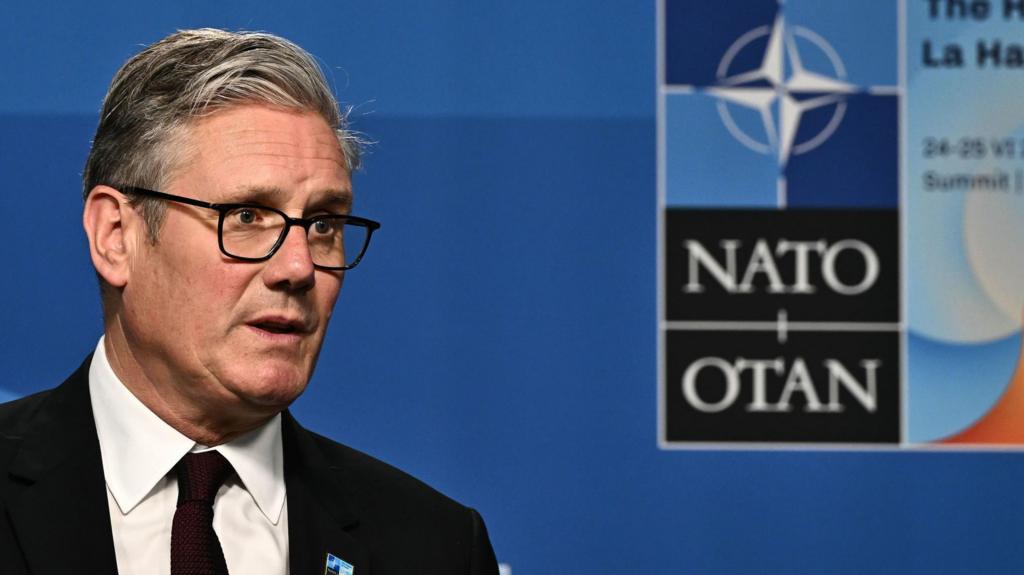Sir Keir Starmer has defended his leadership as the government confirms it will proceed with a vote on welfare reforms, despite significant opposition from Labour MPs.
Efforts to quell a growing rebellion have been unsuccessful, with over 120 Labour backbenchers signing an amendment calling for the proposals to be scrapped, raising the possibility of an embarrassing defeat for the government.
The prime minister insisted the Labour party was “pretty united” on the principle of reforming the welfare system, dismissing criticism as “noises off.”
His comments followed Deputy Prime Minister Angela Rayner’s announcement to MPs that a vote on the government’s welfare bill would proceed as scheduled on Tuesday.
Speaking to the media at a NATO summit in The Hague on Wednesday, Sir Keir acknowledged that welfare reforms were “tough going” but stressed that “the important thing is to focus on the change that we want to bring about.”
He stated: “Are there plenty of people and noises off? Yes of course – there always are, there always have been, there always will be.”
Asked if he had misjudged the handling of the welfare row due to a lack of understanding of his own party, Sir Keir responded: “Many people predicted before the election that we ‘couldn’t read the room,’ we ‘hadn’t got the politics right,’ we ‘wouldn’t win an election after 2019’ because we lost so badly.”
“We got a landslide victory. So I’m comfortable with reading the room and delivering the change the country needs.”
He argued that the current welfare system “doesn’t work as it stands for people who desperately need help to get into work or for people who need protection.”
“We were elected to change that which is broken, and that’s what we will do, and that’s why we will press ahead with reforms,” he added.
Earlier in the House of Commons, Rayner had told MPs “we won’t walk away and stand by and abandon millions of people trapped in a failing system.”
She accused the Conservatives of having “no plans and no idea” on welfare policy.
Shadow chancellor Sir Mel Stride asked Rayner if she could defend the bill and explain why she believed so many of her own colleagues were “wrong.”
Rayner replied that the bill would help people into work and end eligibility reassessments for the severely disabled.
With the prime minister at the NATO summit, Rayner and Sir Mel stood in for their respective leaders at the weekly question session.
The government’s Universal Credit and Personal Independence Payment Bill proposes changes to eligibility criteria for certain disability and sickness benefits.
Ministers have stated that the bill is crucial to slow the increase in the number of benefit claimants.
However, Labour critics of the bill argue that there has not been sufficient assessment of the measures’ impact, which they claim will push large numbers into poverty.
Conservative leader Kemi Badenoch has indicated her party might support the bill, provided the government guarantees it will reduce the welfare budget and increase employment without raising taxes – conditions the government is unlikely to meet.
Both Rayner and Sir Keir have insisted on proceeding with the welfare changes. However, the numbers currently appear unfavorable for the government, and senior ministers have been contacting Labour MPs to persuade them to back the bill.
To date, only one Labour MP, Samantha Niblett, has withdrawn her name from the list of MPs supporting the amendment.
The decision of whether to vote on this specific amendment rests with the Speaker of the House of Commons, Sir Lindsay Hoyle, although the likelihood has increased with additional MPs from parties including the SDLP and the DUP adding their names to the list.
Given the level of opposition to the bill within Labour ranks, speculation arose that the government would be forced to withdraw the vote to avoid defeat.
Asked by Sir Mel if this was the case, Rayner replied unequivocally: “We will go ahead on Tuesday.”
Stride stated that Labour backbenchers had “heard that before” regarding the winter fuel payment, referencing the government’s U-turn last month.
He then reiterated his leader’s offer for the government to back their bill and avoid defeat, provided ministers commit to reducing the overall welfare bill.
Rayner responded with an attack on Sir Mel, who served as work and pensions secretary in the previous Conservative government.
“He demands further welfare savings, from the man who was in charge as the welfare bill absolutely ballooned. They say cut the welfare bill – they failed.”
Sir Mel stated that the government’s bill would fail to stop the number of claimants from rising and that tax rises in the autumn were “inevitable.”
He asked Rayner if she could rule out tax increases. She responded that the criticism was “a bit rich” coming from a party that had introduced “the biggest tax rises.”
During the debate, Liberal Democrat deputy leader Daisy Cooper asked Rayner for a guarantee that “not a single person would lose a penny” until the review into Carer’s Allowance overpayment had been completed and the recommendations implemented.
The review was announced after more than 134,000 carers were forced to repay thousands of pounds in overpayments.
Rayner said the government was “taking steps” on the issue.
Watch: Mel Stride pushed to say sorry for Liz Truss’s mini-budget
The tax would be applied to manufacturers of milk-based drinks and dairy-based substitutes, under the plans.
The British Hair Consortium is calling on Rachel Reeves to cut VAT to 10% in June’s spending review.
The Conservative leadership contest has been whittled down to four candidates in a vote of Tory MPs.
The former work and pensions secretary becomes the fourth person to join the race to replace Rishi Sunak.

